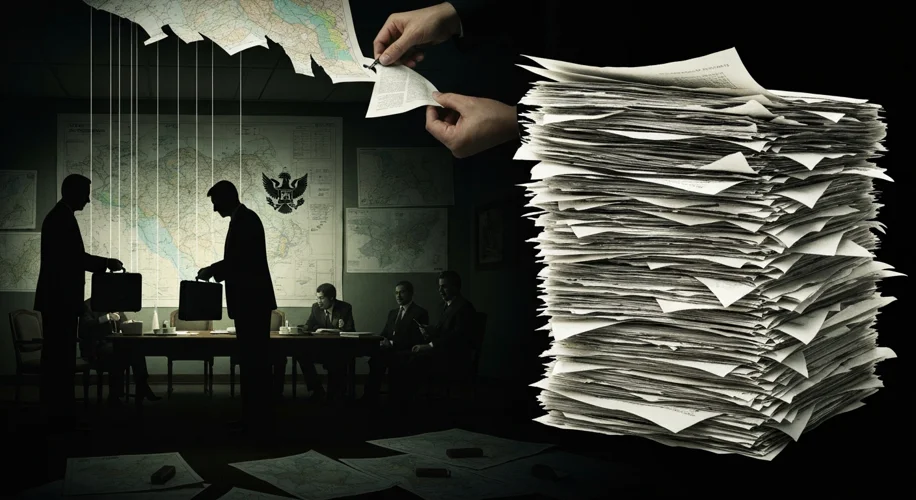In the hushed corridors of power, where policy is forged and national interests are debated, a scandal once erupted that threatened to shake the very foundations of American democracy. It was an affair woven from clandestine arms deals, secret wars, and a blatant disregard for democratic oversight. This was the Iran-Contra Affair, a complex and controversial chapter in American history that exposed the unsettling reality of a shadow government operating beyond the reach of Congress.
The Cold War Crucible: A World Divided
The 1980s were a time of escalating Cold War tensions. The United States, under President Ronald Reagan, was engaged in a global struggle against Soviet influence. This era of proxy wars and ideological battles provided the backdrop for the events that would unfold.
Tehran’s Tangled Web: Arms for Hostages
In the early years of Reagan’s presidency, Iran was a nation grappling with the aftermath of its 1979 Islamic Revolution and embroiled in a brutal war with its neighbor, Iraq. The United States, meanwhile, was deeply concerned about American citizens held hostage by Hezbollah militants in Lebanon, a group with strong ties to Iran. A clandestine operation began to take shape, orchestrated by a secretive group within the National Security Council (NSC) and the CIA.
Their plan was audacious and highly controversial: sell arms to Iran, a nation officially under an arms embargo, in exchange for the release of the American hostages. The key figures driving this initiative included National Security Advisor Robert McFarlane, and later, John Poindexter, along with NSC staffer Oliver North. Their rationale was that these arms sales, while technically illegal, would demonstrate goodwill to moderate elements within Iran and secure the hostages’ freedom.

Nicaragua’s Shadow War: Funding the Contras
Simultaneously, in Central America, the Reagan administration was deeply invested in supporting the Contras, a rebel group fighting to overthrow the socialist Sandinista government in Nicaragua. Congress, however, had repeatedly passed the “Boland Amendment,” a series of legislative measures designed to prohibit U.S. government funding of the Contras. This created a direct conflict between the executive branch’s foreign policy objectives and the legislative branch’s authority.
Undeterred, Oliver North and others within the NSC devised a way to circumvent Congress. They established a private network, funded in part by the profits from the illegal arms sales to Iran, to channel money and weapons to the Contras. This network operated with a disturbing degree of autonomy, utilizing foreign intermediaries and private donors to equip and train the Contra rebels. The operation was shrouded in secrecy, with its true extent and funding sources hidden from public and congressional scrutiny.
The Unraveling: Lies and Investigations
The carefully constructed secrecy began to crumble in November 1986. News reports exposed the arms-for-hostages deal with Iran, sparking a firestorm of controversy and immediate denials from the Reagan administration. As public pressure mounted, a presidential commission, led by Senator John Tower, was formed to investigate. Simultaneously, Congress launched its own inquiries.
During these investigations, the role of Oliver North came under intense scrutiny. His testimony, often contradictory and evasive, revealed the intricate web of deception and illegal activities. Investigators discovered shredded documents, evidence of a cover-up, and the shocking revelation that profits from the arms sales were diverted to fund the Contras, a clear violation of the Boland Amendment.

Consequences and Reckoning
The Iran-Contra Affair had far-reaching consequences. President Reagan, though never directly implicated in knowing about the diversion of funds, faced significant public criticism and a severe blow to his credibility. Several key figures, including John Poindexter and Oliver North, were indicted on criminal charges, though their convictions were later overturned on appeal or pardoned. McFarlane pleaded guilty to a misdemeanor charge and was sentenced to probation.
The affair severely damaged the Reagan administration’s reputation, raising profound questions about executive power, accountability, and the rule of law. It highlighted the dangers of unchecked presidential authority and the importance of congressional oversight in foreign policy. The scandal led to reforms within the NSC aimed at improving transparency and adherence to legal and ethical standards.
A Lasting Legacy: The Shadow Government
The Iran-Contra Affair serves as a stark reminder of how easily policy can be manipulated in the pursuit of perceived national interests, even if it means operating outside the bounds of law and democratic principles. It exposed the potential for a “shadow government”—a group of unelected officials operating with significant autonomy—to conduct secret wars and clandestine operations, bypassing the will of the people as expressed through their elected representatives.
The questions raised by Iran-Contra continue to resonate today, urging us to remain vigilant about the balance of power between the executive and legislative branches, and to demand transparency and accountability in all matters of government. The echoes of this complex scandal remind us that the fight for democratic principles is an ongoing one, demanding constant attention and unwavering commitment.


